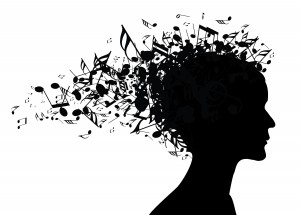When walking to class, doing schoolwork, or simply hanging out, music works as a mediating background. I realized that on this campus, and probably most other college campuses, everyone is almost always using music to create their own personal buffer to the world. There is approximately an endless number of playlists designed around what you’re feeling and want to feel. Even in movies and tv, music is used as some sort of regulator for mood, used to evoke greater emotion from the audience. I decided I wanted to find out how much music truly impacts human emotion, thus affecting the way in which the world is perceived.
In finding out how perception may be impacted, I found a large overview, or meta-analysis, examining an array of experiments done to study the relationship between (no lyric) music and perception. Differing experiments were discussed, each one having slightly different variables. In most of these experiments, visual stimuli were used in combination with music to help evaluate the ways and situations in which music has an effect on perception (Hanser, Mark 305).
Authors Waldie Hanser and Ruth Mark stated that these experiments involved participants listening to happy or sad music while or before having to rate the emotionality of a picture of a person’s facial expression. The facial expressions were rated on a point scale. It was found in multiple experiments that participants listening to happy music while rating a picture would rate it more highly in mood, while participants listening to sad music while rating a picture would rate it lower in mood (Hanser, Mark).
Additionally, experiments were done in which music was played prior to the presentation of the visual stimuli to be rated by participants. In a specific study by Nidhya Logeswaran and Joydeep Bhattacharya, as explained by Hanser and Mark, a wider range of music was used than just happy and sad, measuring on the music and the person on the variable of arousal. Additionally, they had participants rate neutral visual stimuli (Hanser, Mark 314). In this specific study, the effects of the music seemed to be stronger when the stimuli (such as a picture of a person’s facial expression) was neutral or ambiguous (Hanser, Mark 313). This overview showed that there is a definite correlation between happy and sad music and the way in which people perceive visual stimuli.
Writing for Scientific American, sognitive science professor Mark Changizi has an argument in support of Hanser and Mark’s overview, specifically citing this Logeswaran and Bhattacharya study in discussing how music affects emotion. Changizi explains that the study shows a connection between auditory senses and the evoking of emotion, but clarifies that it is not clear why music has such an effect. In trying to deduce why music is so emotionally provoking, he hypothesizes that this is due to music’s relation to language, making it an abstract form of it (Changizi). Changizi’s other hypothesized reason for music’s emotional effect is its relation to the human movement of dancing, its auditory stimulation helping bringing it to the mind.
All in all, both Hanser and Mark’s meta-analysis and Changizi’s hypothesizing agree on the correlation between music and a person’s emotions and feelings having a possible causation in the auditory stimulation crossing over through the system of senses. While no causation has been established, Hanser and Mark concluded that in future studies there must be experiments in which a more direct relationship can be established (320).
Sources

